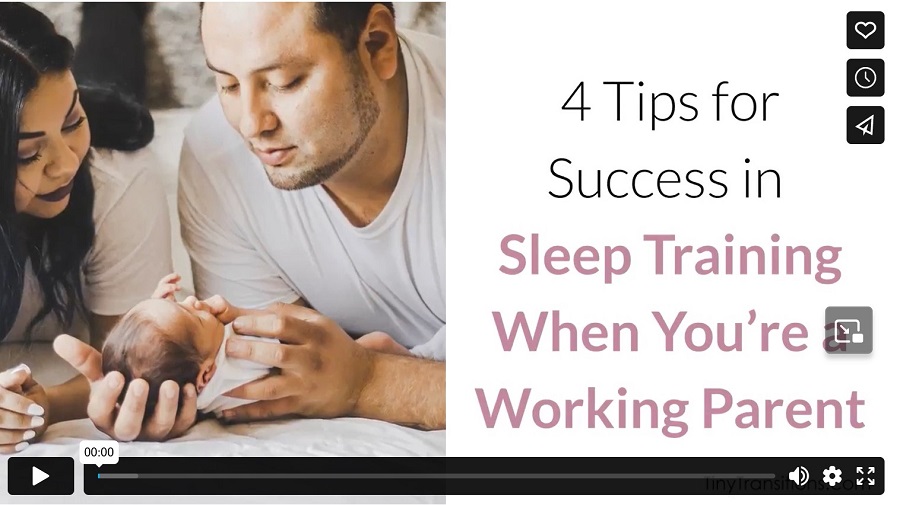Caring for a baby when you work full or even part-time is a challenge, so sleep training might fall to the wayside. Between getting to know your new little one, finding quality child care, and meeting the demands of your bosses and clients, you probably find yourself exhausted by the end of the day. You’re grateful for whatever sleep you do get, even if your night is interrupted multiple times by a crying or restless infant. After all, any sleep is better than no sleep, right?
Right?!
The thing is, once your baby hits the four-month mark, you should be able to train him to go longer stretches at night. Of course, not getting to see his favorite grown-up whenever he wants can be upsetting for him, and it can feel easier just to get up and help him instead of training your baby to sleep alone. It’s a little counterintuitive, but getting some lousy sleep for a few days during sleep training is actually better for everyone in the long run.
Work-Related Benefits of You Getting Better Sleep
There are some times in your life when you will need to power through your sleepiness and get the job done, but those times should be few and far between. The quality and quantity of sleep you get regularly are powerful predictors of how successful you will be during your workday. Here are just a few ways how well your sleep affects your work life:
- Productivity: Let’s start with the bottom line, shall we? When you’re habitually tired, your bottom line suffers in the long run. You’re more likely to get off task at work because your tired brain is struggling to keep up an exhausting pace. Fewer well-completed tasks can lead to trouble with your bosses or clients, but also, each task may take longer to finish, causing you to miss important deadlines. Then, when things come to a head (and you know they will), you’ll already be exhausted and likely in a bad mood from all of the extra stress, which can make the confrontation even more unpleasant.
- Physical health: There are so many health benefits of good sleep that cross over into your work life. For one, when you’re well-rested, you don’t reach for the junk food and coffee as often, which is beneficial for your heart and your waistline.
- Physical safety: Studies have shown that a tired brain isn’t as safe as a well-rested brain. Not only does less than five hours a night quadruple your likelihood of getting into a car accident, but it also increases work-related accidents. According to OSHA, tired workers are more likely to get hurt or hurt other people on the job than employees who are well-rested.
- Mental health: It’s no secret that a tired baby is generally a crabby baby, and the same carries over to adults (we’re just better at hiding it usually…). When you don’t get enough sleep, your mental health suffers, and things that you would normally be able to keep in check might start to spiral. Additionally, sleep affects how well your brain processes memories, so it’s crucial to sleep well if you want to remember things like anniversaries, doctor’s appointments, and tender moments with your family.
- Financial wellness: There are also financial benefits associated with getting good sleep. According to healthysleep.org, people who sleep well earn an average of 16% more than bad sleepers in the same field. Good sleepers also tend to worry less about paying bills and have more money in savings than people who don’t sleep well.
How to Sleep Train as a Working Parent
It is possible to sleep train as a working parent, but there are things to consider that you might not have to if you don’t have or choose to work. Here are four tips for sleep training as a working parent:
1. Be strategic: One of the best ways to minimize the strain from sleep training is to be strategic when you start. Ferber sleep training typically takes one to two weeks for the full benefits, and the cry it out method can take up to a week. Most working people don’t have many extra days off, so if you can’t take a personal day, try to start sleep training on a three-day weekend. At the very least, you should start on a Friday because those first two or three days will be the roughest.
2. Look ahead: This tip goes hand-in-hand with the first one because you need to do some strategic planning with your and your baby’s schedules. Don’t start sleep training when you have a high-stress project or deadline approaching. Your brain and body will be tired, and you should do everything possible to avoid making major life or career-changing decisions until after things have settled down a bit. You should also wait to start sleep training if you or your baby have a trip, vacation, or medical procedure coming up that could throw off your progress.
3. Schedule your own naps: When you first start sleep training, you should do everything in your power to schedule a little extra shut-eye for yourself. Make a “Do Not Disturb” sign for your cubicle, and try to take a power nap at least once a day. Skip working through lunch or playing on your phone – just turn everything off for 20 minutes and let your body rest during the day. It’ll work wonders.
4. Watch what you eat and drink: By the second day of sleep training, you might be dragging a little bit, and that can cause some unhealthy cravings to pop up. Do your best to stay away from junk food and don’t drink caffeine after two or three in the afternoon. You don’t want to introduce the possibility that you won’t be able to sleep once baby goes down. Instead of reaching for that triple shot espresso, grab a power snack like a hard-boiled egg, a cup of yogurt with granola, fresh fruit and veggies, almonds, or a couple of squares of dark chocolate.
All parents are working parents, but when you have a job outside of the home as well, it adds a level of complexity that can make sleep training especially challenging. But it’s worth it. When you and your baby sleep better, you both can do your jobs better, and that is something to strive for.
Video



